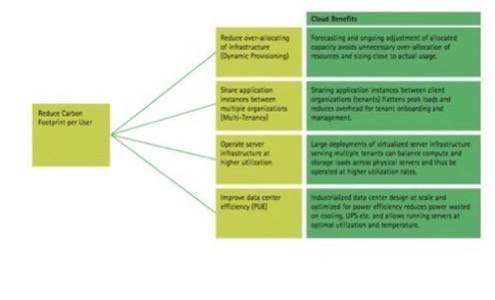Greenpeace raised the heat several months ago when the organization lambasted data center operators for contributing to global warming. The organization has recently intensified criticism by targeting Facebook in campaigns to force the company to move away from using coal-based utilities.

In contrast, a new study by Microsoft, Accenture and WSP Environment & Energy reports that cloud computing reduces energy use and carbon emissions.
Skeptical? In this case, we do not argue that data centers can be greener than corporate IT. But there is a distinction to make between efficiency and the overall effect of data centers on the environment.
New data centers are being built to keep up with the constant stream of information we produce. Each one of those data centers can consume exponential amounts of power and in the process produce a lot of pollution.
Microsoft, Accenture argue for the benefits of data centers. They state that public, cloud computing environments running enterprise applications can cut energy consumption and carbon emissions by 30% compared to an organization that runs the same software on its own infrastructure.
In addition, cloud computing data centers provide efficiencies that organizations can not achieve.

We don’t think there is much to argue on this point. Multi-tenancy means that thousands of companies may run applications in one cloud computing environment.
Amazon pioneered methods for creating efficiencies on its servers that just can’t be matched by a company operating its own server environment. Google, Microsoft and others have made continuous improvements in optimizing data centers.
With such optimization, it only makes sense that a shared data center would save more energy than a corporate IT department.
But around the world, data centers are getting built in record numbers. And they consume a lot of power.
In Oregon, Facebook is building a data center that Greenpeace is targeting. The organization maintains that the data center will be powered by coal. Facebook disputes that fact.
Regardless, the community of Prineville is getting its infrastructure beefed up to accomodate Facebook. A substation is planned that can handle 90 megawatts of power. The substation there now can only handle 30 megawatts.
In the years to come, this story will repeat itself all over the world.
The New York Times reported this week:
Lisa Rhodes, vice president of marketing and sales at Verne Global, a data center company based in Iceland, said that “according to the Environmental Protection Agency, data centers now account for 1.5 percent of all electricity consumption in the U.S. and by 2020, carbon emissions will have quadrupled to 680 million tons per year, which will account for more than the aviation industry.”
The issue is not with efficiencies. That’s a given. The real problems come as we produce more digital information and in the end consume more energy than ever imagined.
















